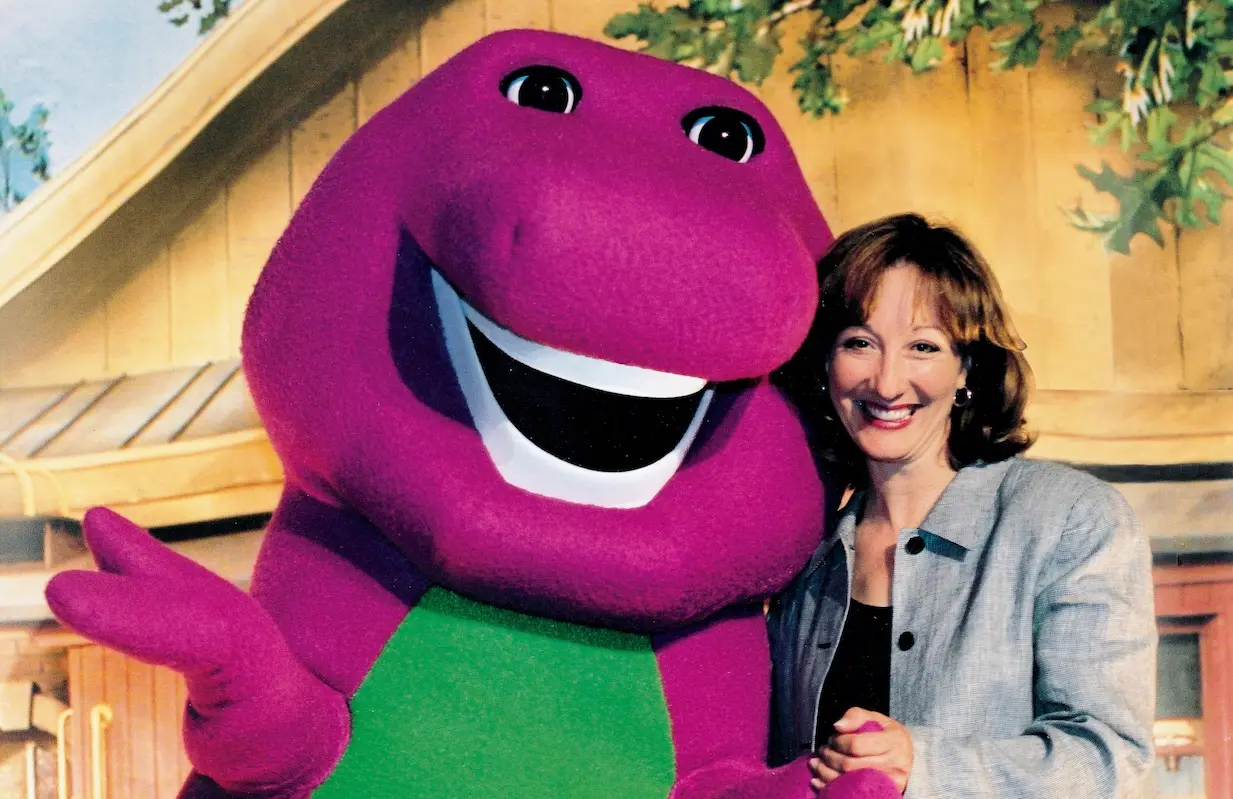Peacock Docuseries Traces the Rise of Hate Back To Barney the Dinosaur
-
 Barney and Sheryl Leach, Barney's creator. (PBS/Everett Collection)
Barney and Sheryl Leach, Barney's creator. (PBS/Everett Collection)Even if you only have dim memories of Barney, the purple dinosaur who dominated kiddie TV in the 1990s, you should watch I Love You, You Hate Me, a new documentary on Peacock that explores how the cuddly character managed to be both the star of a top-rated PBS show and Public Enemy No. 1 among adults. It also has the audacity to draw a through line from people’s rage at a costumed character to the fury that seems to dominate every aspect of the present day.
Two hours long — and, annoyingly, broken up into two parts with commercial inserts — the film comes to us from Scout Productions, and apropos of the studio that gave us both Queer Eye and Mr. Death, it hits notes both sweet and harsh. First we get the behind-the-scenes story of how a lovely Christian wife and mom named Sheryl Leach created Barney and Friends for her local PBS station in Texas. Though Leach herself declined to be interviewed, we do hear from lots of people who worked on the show — and it seems like they all had a joyous, rewarding time doing it.
They make it clear that while many successful children’s TV shows cater to kids and adults alike, Leach wasn't interested in playing that game. "We want the adults to approve," she says in archival footage. "But it’s really not for adults." To that end, we meet the show’s original head writer, who wrote Barney as a bit of a smart aleck, patterned on Bruce Willis's character in the then-popular ABC series Moonlighting. He was fired.
Even when it's noting that the guy who used to wear the Barney costume is now a tantric sex guru, the documentary does an admirable job of capturing those early days without a wink or sneer. The songs were uplifting (if numbingly repetitive), the hugs were plentiful, and everyone was welcome. "All the diversity, every single race represented," says Pia Hamilton, a Filipino American who was one of Barney’s on-screen friends. "Barney really means so much to me," she adds, her eyes welling with tears.
Such sentiments, of course, make you feel bad for ever thinking a single evil thought about the purple fellow. But just try not to laugh while watching the San Diego Chicken pummel a lookalike Barney at a major-league baseball park while 50,000 fans cheer him on.
Before we get there, I Love You, You Hate Me expertly marshals different pop-culture voices to explain how the anti-Barney sentiment bubbled up so easily. We’re reminded that the '90s were the apogee of mega-irony, of Pulp Fiction, Nirvana, Letterman — and in the midst of all of this, Jerry Springer's talk show.
"One day out of nowhere, we were doing a story about race, and the first fight broke out," Springer’s producer Burt Dubrow recalls. That show was rewarded with a spike in the ratings, and lessons were learned: "A little bit of anger, a little bit of pain, isn’t necessarily a bad thing for television," Dubrow says.
It turned out to be a very short trek from "a little bit of anger" to outrage being the default setting of all media. Steve Burns, who was host of another bright little kids show called Blue's Clues, offers a salient comparison: If you watch Sesame Street, you see characters with flaws. That makes them relatable to grown-ups. "There’s something broken about Grover and there’s something broken about Bert," Burns says. "But there’s absolutely nothing broken about Barney."
From there, the show transforms into an assessment of mostly male rage against the purple dinosaur — and, it seems, all that Barney represents: tolerance, diversity, and guileless adoration. The tone is set by old videotape of men destroying Barney puppets, something called the I Hate Barney Secret Society, and worse.
In the end the show makes a surprisingly persuasive case that maybe the Barney backlash of 30 years ago was the canary in the coal mine — that it served as an early warning of what a culture steeped in irony and conditioned to react caustically to everything on a screen could become. It suggests that these isolated acts of cultural rage would coalesce into the violence of Charlottesville and the Pulse nightclub shooting, and it doesn't seem like such an outrageous conclusion. The purple America where Barney made such a splash has long since divided into red and blue Americas. It’s hard not to agree with Dean Wendt, who voiced Barney for a decade, when he says, "We need Barney now, but we don’t live in Barney’s world."
I Love You, You Hate Me premieres October 12 on Peacock.
Aaron Barnhart has written about television since 1994, including 15 years as TV critic for the Kansas City Star.
TOPICS: I Love You, You Hate Me, Peacock, Barney & Friends